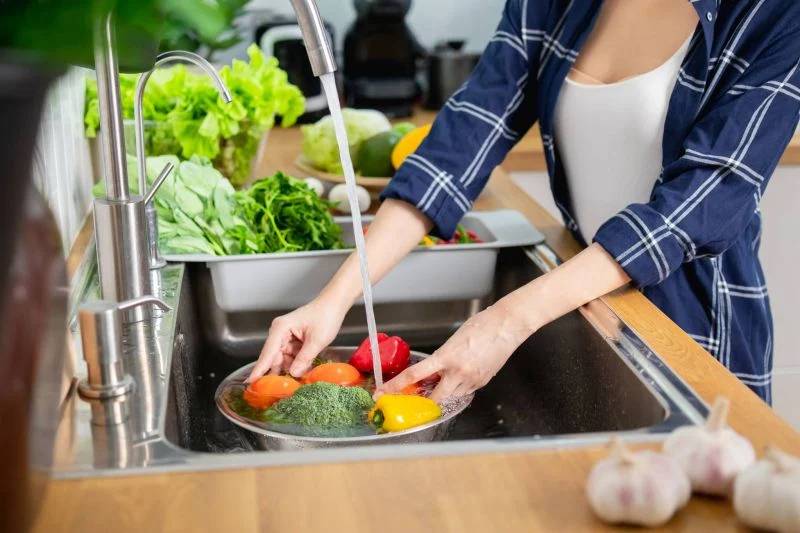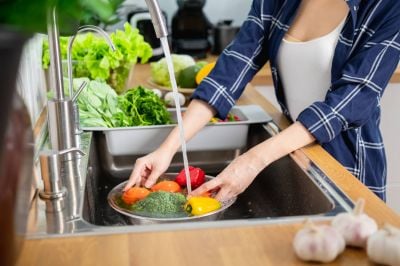
It is recommended that fruit and vegetables be washed in safe water, and soaked for five minutes in a chlorinated water solution. (Photo: Bigstock)
Now that cholera has reappeared in Lebanon for the first time since 1993, debate is heating up around the risk of contamination, with conflicting information pouring in on how best to protect oneself from the latest epidemic.
Since Oct. 5, 305 cases and 11 deaths have been recorded, according to the latest report from the Health Ministry on Oct. 26.
Many people have questions, especially about how to disinfect food and the risks of eating it raw.
What are the recommendations for healthy consumption in a time of cholera?
Wash fruit and vegetables thoroughly
For healthcare specialist May Jurdi, the greatest danger to the public lies in uncooked seafood (fish, shellfish).
“These are most exposed [to cholera], especially if they have lived in polluted waters, as is the case in Lebanon,” she said.
The same warning applies to uncooked meat, which is associated with different types of infections. In times of epidemic, it is therefore advisable to cook meat, fish, and all seafood to protect oneself.
On the question of whether fruit and vegetables can be contaminated by polluted water — in a context where untreated liquid sewage is used extensively for irrigation, or where sewage has seeped into the fresh water network — Jurdi said that “no fruit or vegetable is more dangerous than another, but they should all be cleaned properly, especially if they are eaten raw.”
She recommends washing them with safe water using a sponge and unscented soap (for example, natural Lebanese soap), then rinsing them with water and leaving them to soak for five minutes in a chlorinated water solution.
“It is true that vinegar prevents bacteria, it must be added in too large quantities to be effective against cholera, which would ruin the quality of fruits and vegetables,” Jurdi added.
She recommended avoiding eating raw fruits and vegetables in restaurants since it is impossible to know how well they’ve been washed.
Farming rep says No danger to agricultural products in the Bekaa
Ibrahim Tarshishi, head of Bekaa Farmers Association, told L’Orient-Le Jour there is minimal risk of contamination in vegetables and fruit, most of which come from the Bekaa Valley.
“Our vegetables are perfectly healthy because they are watered with clean water from wells,” he said.
In this agricultural region, when springs dry up in May and June and the drought begins, the only means of irrigation is groundwater collected from wells, according to Tarshishi.
“According to a decree issued by the Bekaa governor, it is prohibited to install irrigation stations from Zahle to Lake Qaraoun, passing through Baalbeck and Hermel,” Tarshishi explained.
“It is therefore strictly forbidden to use generators on the river or near the sewage outlets in this entire area, which is a guarantee that all fruits and vegetables in the Bekaa are clean and edible,” he added.
Kamal Slim, a water quality expert who has conducted extensive research on the Litani River basin, has doubts about the pristine state of the Bekaa’s agricultural produce.
“Until weekly tests are carried out on water sources — even daily in the case of a crisis like this — we can’t be sure of anything,” Slim told L’Orient-Le Jour. “Water pollution is nothing new, but it is a vector for many diseases.”
He added that it is important to take advantage of the attention being paid to the water issue due to the epidemic, and to use this momentum to create a sustainable campaign to overcome the thorny problem of fresh-water pollution.
“If the fruit and vegetables of the Bekaa were contaminated with cholera, there would be hundreds of cases,” Tarchichi insists, adding that farmers to wholesalers are carrying out “rigorous monitoring” of produce.
“We know all the traders well, and if any problem is detected, the goods are seized and those responsible thrown in jail,” he continued.
“Fortunately, so far there have been no such incidents,” Tarshishi continued. There have been no violations of the law because irrigating with unclean water would not only be a danger to public health but also, and primarily, to the farming families, whose reputation would be tarnished.”
“We can see that cholera cases are concentrated in Arsal, an area bordering Syria that is home to a refugee camp with a high concentration of inhabitants who find themselves obliged to use unsafe water,” he said.
Sterilizing water at home
“Whether you use tap water, water from tankers, or spring water sold in gallons, it is imperative to add chlorine (bleach), which can be found on the market under the names Odex or Clorox,” Jurdi warned.
“Avoid the scented products. Classic bleach is recommended because aromas such as lemon or jasmine contain impurities,” she added.
She recommends two drops of chlorine per liter of water, the equivalent of a teaspoon per gallon.
“With the epidemic spreading,” she continued, “it is very important to focus efforts on the water distribution network at the national level, in order to control the water reaching both suppliers (public or private) and vendors.”
According to Jurdi, the major problem are the deficiencies in the water system,” Jurdi sayd, “as well as poor wastewater management, which has been a problem for over 25 years.
“All water running in distribution networks must contain chlorine,” she said. “Expanded monitoring must be implemented at this critical time.”
This story was originally published in French in L'Orient-le Jour, translated by Sahar Ghoussoub.
